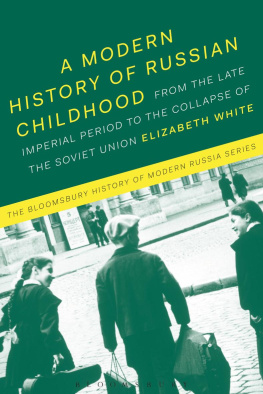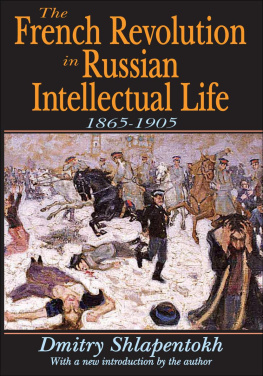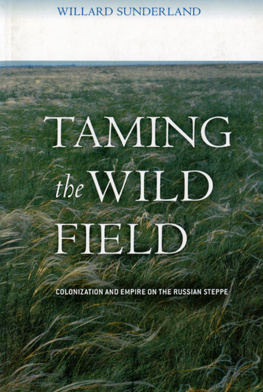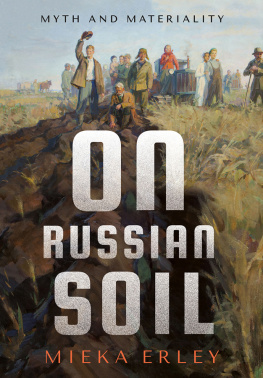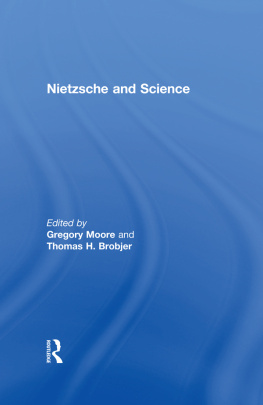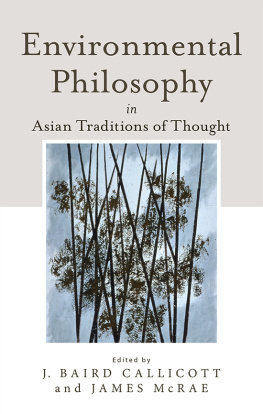The Development of Russian Environmental Thought
This book provides a comprehensive overview of the very rich thinking about environmental issues which has grown up in Russia since the nineteenth century, a body of knowledge and thought which is not well known to Western scholars and environmentalists. It shows how in the late nineteenth century there emerged in Russia distinct and strongly articulated representations of the earths physical systems within many branches of the natural sciences, representations which typically emphasized the completely integrated nature of natural systems. It stresses the importance in these developments of V. V. Dokuchaev who significantly advanced the field of soil science. It goes on to discuss how this distinctly Russian approach to the environment developed further through the work of geographers and other environmental scientists down to the late Soviet period.
Jonathan D. Oldfield is Reader in Russian Environmental Studies, University of Birmingham, UK.
Denis J. B. Shaw is Honorary Senior Research Fellow at the School of Geography, Earth, and Environmental Sciences at the University of Birmingham, UK.
First published 2016
by Routledge
2 Park Square, Milton Park, Abingdon, Oxon OX14 4RN
and by Routledge
711 Third Avenue, New York, NY 10017
Routledge is an imprint of the Taylor & Francis Group, an informa business
2016 Jonathan D. Oldfield and Denis J. B. Shaw
The right of Jonathan D. Oldfield and Denis J. B. Shaw to be identified as authors of this work has been asserted by them in accordance with sections 77 and 78 of the Copyright, Designs and Patents Act 1988.
All rights reserved. No part of this book may be reprinted or reproduced or utilised in any form or by any electronic, mechanical, or other means, now known or hereafter invented, including photocopying and recording, or in any information storage or retrieval system, without permission in writing from the publishers.
Trademark notice: Product or corporate names may be trademarks or registered trademarks, and are used only for identification and explanation without intent to infringe.
British Library Cataloguing in Publication Data
A catalogue record for this book is available from the British Library
Library of Congress Cataloging-in-Publication Data
A catalog record for this book has been requested
ISBN: 978-0-415-58059-5 (hbk)
ISBN: 978-1-315-67017-1 (ebk)
Typeset in Times New Roman
by Apex CoVantage, LLC
The main arguments underpinning this book have evolved over the course of the last decade or so and are linked to the individual and collaborative work of the two authors. We have been particularly interested in exploring Russian understandings of concepts and ideas relating to nature and societynature interrelationships. As part of this, our empirical focus has been very much on geography and neighbouring areas of science, and we both share a deep interest in the specificities of what might be termed the Russian geographical tradition. Our respective experiences have helped to cultivate a strong sense of the richness of this tradition which we feel remains muted within the English-language literature.
The initial outline of the book emerged during the course of several fieldtrips to Helsinki and St Petersburg during 20072009. Away from the hustle and bustle of academic life back in the United Kingdom and immersed in the work of late nineteenth and early twentieth century natural scientists, these periods afforded us the opportunity to reflect more deeply on the contribution made by Russian geographers to our understanding of natural physical systems. As a whole, our research probably led to the posing of as many new questions as it succeeded in answering old ones, and so this cannot be said to be a finished piece of work. But we hope that our work will stimulate others to pursue related areas of enquiry.
In undertaking this research, we owe an enormous debt of gratitude to the many scholars and institutions whose aid has proved indispensable. It is impossible to list all those who have provided guidance and advice over the years and we apologize for any omissions. First and foremost, our Russian colleagues in St Petersburg, Julia Lajus, Anastasia Fedotova, Marina Loskutova, Alexandra Bekasova, Alexei Kraikovski, Natalya Sukhova, and Irina Vibe have been incredibly helpful in supporting our research, sharpening our understanding of key issues, and ensuring that our work in Russia has been both productive and enjoyable. Indeed, their willingness to discuss key ideas whether in the comfort of their home, during the chaos of numerous conferences and workshops, or even on the deck of an old Soviet icebreaker, has been a highlight of our collaborative work. In Moscow, Nicolai Dronin, Alexei Postnikov, Olga Aleksandrovskaya, and the late Alexsei Karimov provided invaluable assistance and insight along the way. Nearer home, David Moon has been a source of continual support, always willing to offer advice and thoughtful insight whether by email or more informally over a beer. We have also benefitted from discussions with John Thornes, Martin Parry, Simon Dixon, Michael Heffernan, Nick Baron, Mary Bailes, Mike Berry, the late Bob Smith, and the late Lindsey Hughes. Other European scholars who have assisted greatly in the development of our work at different times include Julia Herzberg, Margret Schuchard, Andreas Renner, Doubravka Olkova, Sari Autio-Sarasmo, and Marc Elie. From North America, we have benefitted from discussions with Andy Bruno, Gregory Ioffe, Nick Breyfogle, Pey-Yi Chu, and Rachael Koroloff to name but a few.
Elements of the book have been delivered as papers at various conferences and seminars, and we are particularly indebted to the scholars at the following institutions for their willingness to engage with our work and ideas: the St Petersburg Branch of the Russian Academy of Sciences Institute for the History of Science and Technology; the European University, St Petersburg; the Higher School of Economics, St Petersburg; Moscow State University; the German Historical Institute, Moscow; the Russian Academy of Sciences Institute for the History of Science and Technology, Moscow; Aleksanteri Institute, University of Helsinki; Institute of Contemporary History of the Academy of Sciences of the Czech Republic; Centre dtudes des mondes russe, caucasien et centre europen (CNRS-EHESS), Paris; and Maison Franaise dOxford, Oxford. Those who have read parts of the manuscript include Charlie Withers, David Moon, and Judith Pallot, and we are most grateful for the time and effort they took to provide constructive feedback. Needless to say, none of the scholars mentioned bears the slightest responsibility for mistakes and shortcomings in this book.
In completing the research on which this book is based, we have utilized a range of libraries and archives. Irina Lukka (Slavonic Collection, National Library of Finland) and Nigel Hardware and Marta Slaska (Baykov library, Birmingham) provided excellent support throughout the research period. More generally, we would like to thank staff at the following institutions for their assistance: Russian National Library, St Petersburg; Library of the Russian Academy of Sciences, St Petersburg; Russian State Library, Moscow; Library of the St Petersburg Branch of the Institute for the History of Science and Technology, Russian Academy of Sciences; Bavarian State Library, Munich; Berlin State Library; British Library; Bodleian Library, Oxford; Scott Polar Research Institute, Cambridge; Archive of the Russian Academy of Sciences, St Petersburg Branch, and the UNESCO archives in Paris.


